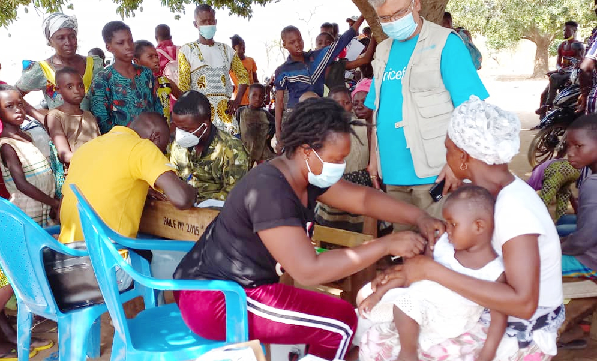
Fighting Yellow Fever in Savannah Region: Community members champion vaccination campaign
Asana Salifu, a 4-year-old girl at Kojokura, a nomadic settlement in the West Gonja Municipality in the Savannah Region, spent about four weeks on admission at the West Gonja Municipal Hospital after she was diagnosed with Yellow Fever in October 2021.
What started as cold and fever became life-threatening as she began to experience jaundice and bleeding after her parents resorted to herbal treatment.
She, however, recovered from the Yellow Fever disease from the hospital after spending the stressful moments with her family. She was subsequently vaccinated against the disease.
Outbreak
Kojokura is one of the communities where infectious disease was first recorded in the Savannah Region last year.
The disease later spread to about 13 of the 16 regions, resulting in the death of over 40 people, with 852 confirmed cases recorded.
Yellow Fever is an infectious disease caused by a virus transmitted to humans by the bites of infected aedes mosquitoes.
The mosquitoes either breed around houses (domestic), in forests or jungles (wild), or in both habitats (semi-domestic).
Once a person contracts the disease, the virus incubates in the body for three to six days.
Vaccination
Vaccination is the primary mechanism to protect against the disease. A single dose of yellow fever vaccination gives life-long protection.
Following the outbreak of the disease last year, the Ghana Health Service and its partners including UNICEF in November last year launched a yellow fever mass vaccination campaign to vaccinate about 5.6 million people from 10 to 60 years old against yellow fever in the country.
That was a continuation of the 2018 Yellow Fever preventive campaign where approximately 5.3 million people were vaccinated in 65 districts across the country.
Ambassadors
Asana’s community was part of the 86 districts targeted in the first phase of the vaccination last year.
Mrs Amina Salifu, mother of the four-year-old girl, after struggling to get her daughter back to life, ensured that the entire household was vaccinated despite claims that the vaccine was not safe.
She also became an ambassador of the vaccines by leading members of the community to centres to take the vaccines.
Recounting her experience with the Daily Graphic, she said: “We didn’t know it was very dangerous so we were just giving her herbal concoctions, but it became severe one afternoon and we had to rush her to the hospital. I thank God for saving her life.”
“I decided to be an ambassador for the vaccine because I realised that if my daughter had vaccinated she wouldn’t have fallen sick like that. I don’t want to see my family and community members dying or suffering,” she added.
Mr Osman Abu, an opinion leader of the community, has instructed that every member should be vaccinated against Yellow Fever.
“We have all embraced the vaccines and currently we are even taking the COVID-19 vaccines as well,” he said.
The West Gonja Municipal Health Director, Ms Gertrude Yentumi, commended the residents for embracing the vaccines while urging them to endeavour to visit the hospital anytime they fell sick, rather than resorting to self-medication.
She said the health directorate had increased its surveillance and community outreach programmes to ensure that they reached out to residents in remote areas.
Second phase
The Ghana Health Service (GHS) with support from its partners last week embarked on a five-day Yellow Fever Preventive Mass Vaccination Campaign (PMVC) to immunise the public against the disease in selected regions across the country.
Over 420,000 persons between the ages of 10 and 60 years are being targeted to be vaccinated in nine regions.
The exercise, which was the second phase of the nationwide campaign, began on Saturday, February 26 and ended last Wednesday, March 2, 2022.
The beneficiary regions are Savannah, Bono East, Bono, Northern, Greater Accra, Eastern, Oti, Ashanti and Upper West.
In the Savannah Region last Sunday, the exercise was orderly and attracted a high turnout.
A team of officials from UNICEF has also been deployed to monitor the exercise and provide technical support to ensure the success of the exercise.
The Chief Field Officer of UNICEF, Tamale Office, Bhanu Pathak, who led a team to monitor the vaccination campaign, commended the Ghana Health Service for reaching out to residents in the nomadic settlements.
He reiterated UNICEF’s commitment to continue to collaborate with the GHS to help provide the needed vaccines and logistics to promote the wellbeing of the people.
In addition to vaccination, Yellow Fever can be prevented by the use of insecticides or insect repellents to avoid mosquito bites, wearing protective clothing, sleeping under a treated net, getting rid of stagnant water and keeping personal and environmental hygiene.
